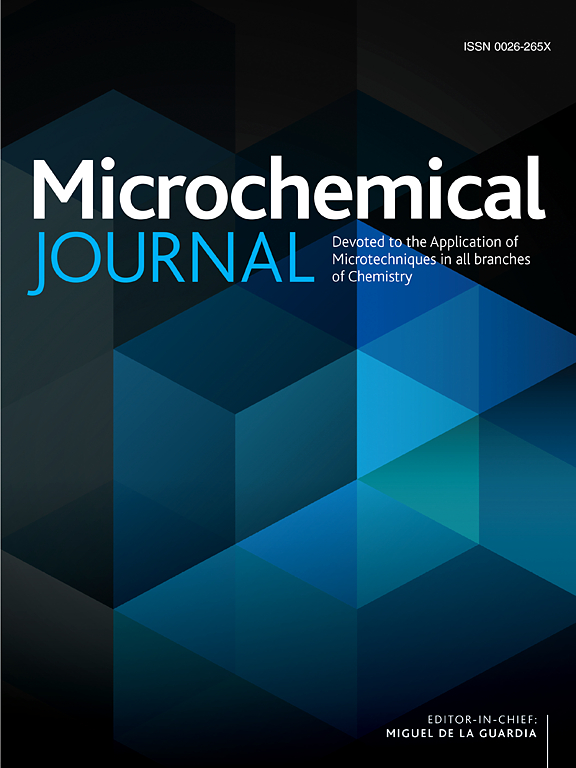Chitosan-Based polymeric nanocarriers for non-melanoma skin cancer: microchemical design, mechanisms, and translational potential
IF 4.9
2区 化学
Q1 CHEMISTRY, ANALYTICAL
引用次数: 0
Abstract
Non-melanoma skin cancers (NMSCs), primarily basal and squamous cell carcinomas, are among the most frequently diagnosed malignancies worldwide, often resulting from chronic ultraviolet (UV) radiation exposure. Current treatments such as surgical resection, radiotherapy, and systemic chemotherapy are limited by invasiveness, poor selectivity, and undesirable side effects. Chitosan, a naturally derived, biodegradable polysaccharide has gained attention as a nanocarrier due to its intrinsic biocompatibility, mucoadhesiveness, and antitumor properties. However, its native limitations, including poor aqueous solubility and restricted drug loading, have necessitated chemical and structural modifications to enhance its clinical utility. Recent advancements in microchemical synthesis and nanoscale engineering have led to the development of modified chitosan-based delivery systems with improved solubility, targeted drug release, and enhanced interaction with tumor microenvironments. This review provides a comprehensive analysis of chitosan nanocarrier design, drug encapsulation strategies, and mechanistic pathways relevant to NMSC therapy. Emphasis is placed on the physicochemical characterization, cellular uptake, and preclinical outcomes of these systems. Finally, the review discusses translational barriers, including regulatory hurdles, batch reproducibility, and large-scale manufacturing, outlining a path toward the clinical application of chitosan nanomedicine in skin cancer treatment.

壳聚糖基聚合物纳米载体治疗非黑色素瘤皮肤癌:微化学设计、机制和转化潜力
非黑色素瘤皮肤癌(NMSCs),主要是基底细胞癌和鳞状细胞癌,是世界上最常见的恶性肿瘤之一,通常由慢性紫外线(UV)辐射照射引起。目前的治疗方法,如手术切除、放疗和全身化疗,受侵袭性、选择性差和不良副作用的限制。壳聚糖是一种天然衍生的、可生物降解的多糖,由于其内在的生物相容性、黏附性和抗肿瘤特性,作为纳米载体受到了广泛的关注。然而,其固有的局限性,包括水溶性差和药物负载受限,需要化学和结构修饰以增强其临床应用。微化学合成和纳米工程的最新进展导致了改性壳聚糖为基础的递送系统的发展,具有更好的溶解度,靶向药物释放和增强与肿瘤微环境的相互作用。本文综述了壳聚糖纳米载体设计、药物包封策略以及与NMSC治疗相关的机制途径。重点放在这些系统的物理化学特性,细胞摄取和临床前结果。最后,综述了壳聚糖纳米药物的转化障碍,包括监管障碍、批量可重复性和大规模生产,概述了壳聚糖纳米药物在皮肤癌治疗中的临床应用路径。
本文章由计算机程序翻译,如有差异,请以英文原文为准。
求助全文
约1分钟内获得全文
求助全文
来源期刊

Microchemical Journal
化学-分析化学
CiteScore
8.70
自引率
8.30%
发文量
1131
审稿时长
1.9 months
期刊介绍:
The Microchemical Journal is a peer reviewed journal devoted to all aspects and phases of analytical chemistry and chemical analysis. The Microchemical Journal publishes articles which are at the forefront of modern analytical chemistry and cover innovations in the techniques to the finest possible limits. This includes fundamental aspects, instrumentation, new developments, innovative and novel methods and applications including environmental and clinical field.
Traditional classical analytical methods such as spectrophotometry and titrimetry as well as established instrumentation methods such as flame and graphite furnace atomic absorption spectrometry, gas chromatography, and modified glassy or carbon electrode electrochemical methods will be considered, provided they show significant improvements and novelty compared to the established methods.
 求助内容:
求助内容: 应助结果提醒方式:
应助结果提醒方式:


